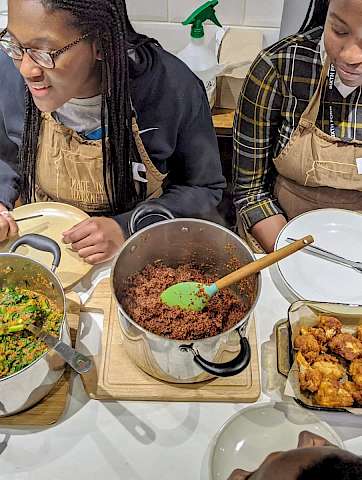Imagine history under a stroboscopic light. The light parts representing the major narratives are in museums and on TV, the dark intervals are written out of history, because of ideologies and taboos. In Cooking and Conversation, we freeze-framed the dark intervals of history and then shared them with people trying to make change in the present.
Back in 2021, we began talking with food charities and arts-in-health groups in Lambeth about their vision for the post-pandemic future. They told us of their desire to engage the guests (often people experiencing mental health difficulties and isolation) more meaningfully in their processes of service delivery.
Phase 1 of the London Community Foundation project began in summer 2022. Guided by the needs of the present, we held story-gathering workshops as well as reaching out to existing contacts in Lambeth. We then recorded oral histories with Lambeth residents who had been involved in collective cooking projects.
We did storygathering sessions in the Science Gallery, Mary Seacole gardens at St Thomas' Hospital and the Little Cat Cafe. We uncovered a number of fascinating stories, including those connected with a democratic community for mental health, popularly known as "The Castle", with many former patients resettled in Bonnington Square and Vauxhall.
Then, finally, we held celebratory community meals in Myatts Fields Park.
In 2023/4, subject to continuation funding, we'll edit the stories into a short film, and host a number of screening and dining events.
When we began this project, we expected the 'healing' factor to come from particular health-giving foods and the cultural memory attached to them. But people recalled the collective decision making and care surrounding the sourcing, cooking and eating of meals as equally important. Our oral history narrators spoke of "working alongside" people experiencing food poverty or mental health difficulties rather than doing things 'for' them or relegating them to the 'sick' role. One of the narrators, Titilola Barbour, calls this "kitchen soup therapy." We learned that human's reliance on everyday structures and rituals, however sophisticated, to hold us together, may have something to do with the nature of our emotional life, in which feelings are often fleeting. We seem to need something solid and relatively unchanging to help us pin our feelings down in order that we may acknowledge or study them. So, the “work of the day” consists in enabling us to discover their emotions through taking responsibility for ordinary tasks; such as cooking, gardening, shopping, relating to others. This often breaks down when we are depressed and our wellbeing suffers as a result.
There is also a huge stigma surrounding mental health difficulties still. We wanted to ensure that the narrators showcased here had really considered the implications of going public with their stories, and that it would be beneficial to them. We have on these pages a cast of oral history narrators who have found the work involved in telling their stories so eloquently to be beneficial and cathartic. In two cases it has even helped people find paid employment.
This project was kindly supported by the London Community Foundation's Lambeth Wellbeing Fund. Myatts Fields Park project and Kings College London, provided uplifting spaces for us to meet.
A note on terminology - we've used the word "patient" rather than the more commonly used "service user" because this is the term favoured by the oral history narrators.


